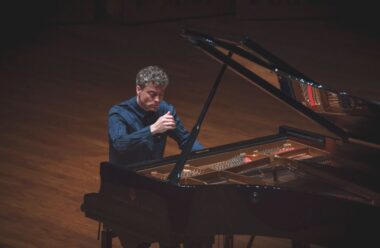 United Kingdom Beethoven, Mozart, Brahms, Schubert: Paul Lewis (piano). Turner Sims Concert Hall, Southampton, 22.4.2025. (CK)
United Kingdom Beethoven, Mozart, Brahms, Schubert: Paul Lewis (piano). Turner Sims Concert Hall, Southampton, 22.4.2025. (CK)

Beethoven – Piano Sonata in C minor, Op.10 No.1
Mozart – Piano Sonata in C, K330
Brahms – Three Intermezzi, Op.117
Schubert – Piano Sonata No.18 in G, D894
The Turner Sims’s 50th anniversary season has seen some memorable concerts by returning artists – all of them welcome, and perhaps none more so than Paul Lewis, who treated a full house to a substantial programme of music by four giants of the Austro-German repertory. He was originally intending to close the recital with Beethoven’s last Sonata, the C minor, Op.111; but the remaining effects of his accident (a car drove into him in a Tesco car park in January) dictated its replacement by Schubert’s G major Sonata, D894.
We did, in fact, begin with a Beethoven Sonata in C minor, though a much earlier one: the first of the three Op.10 Sonatas. Like its successor, the Sonata in F, it tends to live in the shadow of the better-known Op.10 No.3 in D: but it was immediately clear, as Lewis plunged straight in with steely energy, that the young Beethoven meant business. Captivatingly, the stern lines of the opening theme melted, in Lewis’s hands, into the graceful second theme. The Adagio molto began with a simple phrase that seemed to open like a flower; Lewis gave it air and led us through a series of gentle transformations before maintaining an ideal balance of wit, grace and power in the finale. There was enough here to hint at Beethoven’s greatness in this key: the Sonata Pathétique was just around the corner, the Fifth Symphony a decade away.
I occasionally have the feeling, after the opening item of a concert, that heart and mind are already full: that few would feel short-changed if we all went home. This is not one of the great sonatas, but Lewis’s performance made me feel this way.
In similar vein, Lewis next gave us a Mozart piano sonata – K330 – overshadowed by others in its group (K330-333), written in the composer’s early twenties. The risk was that it might sound rather lightweight after Beethoven: but in Lewis’s hands the music’s lightness and pellucid clarity were as refreshing as early morning sunshine. The lyricism of the Andante cantabile looked forward to Schubert; the playful Allegretto finale sparkled like a glass of champagne, with beaded bubbles winking at the brim.
It was probably wise to place the interval here, before we moved to the autumnal shades of Brahms’s Intermezzi, Op.117. The first, Andante moderato, is a Berceuse whose radiant simplicity touches sublimity; the second’s rippling motion ranges more widely before evaporating mysteriously. We sense pain in the restless minor-key figuration of the third; there is balm in the long-limbed lyricism of the major-key central section, but a Schubertian melancholy at the close. Lewis’s sensitive playing admitted us to a small world in each piece.
And so to Schubert himself. Every cloud has a silver lining. When Lewis brought the second instalment of his Schubert Sonatas series to the Turner Sims (in May 2023), I ended my review ‘If Paul Lewis comes back in a few months to play the D894 I will be first in line’. He did, and I missed it, lamenting in my review of the fourth and final instalment (in March 2024) that ‘I am still kicking myself for missing the third instalment (with the wonderful G major Sonata D894)’. I am stopping well short of saying that his accident, and the resulting change of programme, suited me fine: but as a lover of this sonata there is a touch of the serendipitous about my second chance to hear him play it.
Many commentators have written of the work’s ‘mysterious serenity’, its presiding spirit of autumnal gentleness in the face of illness and the young composer’s realisation that his life will be cut short, its nature as a gateway to the late masterpieces. Its very opening, echoing the equally magical beginning of Beethoven’s G major Piano Concerto, establishes this mood: it is not without tension and conflict, but we sense – in this work at least – that the end will be peace.
Paul Lewis’s performance was totally unmannered: no varnish was applied. It wasn’t a slow performance, but everything was given air and space as we were taken on Schubert’s inward journey. There were passages of powerful drama, wide vistas, and a wonderful delicacy and poise; magical changes of key, shifts of perspective, shafts of sunlight. I feel very fortunate to have heard Lewis in this music; and I look forward to the time when he revisits the late sonatas of Beethoven. That time will surely come.
Chris Kettle
